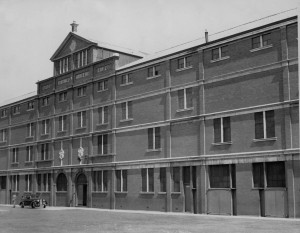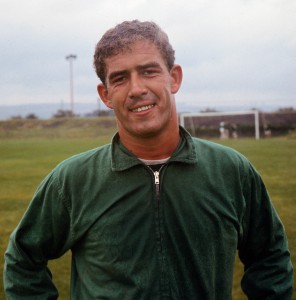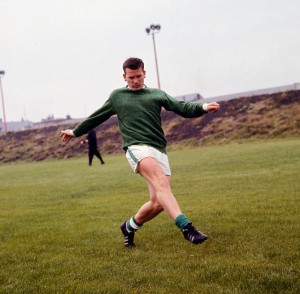The Rugby Park Boys
This was a match with a difference, for me at any rate!
Up till now, I had always been told on the Thursday evening where I was playing and with which side, the reserves or the first team. But that particular week, when there was no reserve match at the weekend, everyone had been told to report to Celtic Park on the Saturday and the team would be announced then.
At that time of that season, Kilmarnock, who had won the title the previous campaign, were lying in 6th place in the table, some 10 points behind Celtic. Like many sides, they were not scoring enough goals and were also losing too many. However, they had some quality players and were quite capable, again like many other sides, of raising their game when they played one of Glasgow’s Big Two, so we all knew that the match would not be easy.
Tension
I found the scene at Celtic Park before the match quite amusing. Every single player, when they arrived, walked right through the building to the tunnel to get out to see the pitch, which was being cleared of the straw by the ground staff. And when they came back in again into the old snooker room – now the table tennis room – I thought it was funny to see the different reactions.
Now, I must confess that I was not looking forward to playing on such a tricky surface but I had more or less resigned myself to it – if picked – and was mentally getting myself ready. Most of the others seemed to be doing the same but there were a few, including some experienced players, who were almost fuming at the thought of playing on such a surface.
Comments ranged from : “Its in terrible state” to “You can’t possibly play on that!” to “ The ref’s bound to call it off” to “Quite disgraceful, that’s what it is!”.
Anyway, while this anguish and even anger was being displayed in the table-tennis room, our coach Neilly Mochan came in to tell us that referee Mr McKenzie from Coatbridge had just inspected the pitch and found it playable! Neilly was a wise man. As soon as he had given us the news, he pushed off! And he was right to do so. As soon as he left the room, the voices were raised once more although this time even more vociferously. It was to no avail, though…the game was going ahead.
The Team
The team had not yet been announced at that point. This was a new thing for me, although I would get used to it in the forthcoming years. Suddenly, Jock Stein pushed open the door of the room, stood just inside the entrance and read out the from a sheet of paper: “Right, gentlemen, the team the afternoon is Simpson, Craig, Gemmell, Murdoch, Cushley, Clark, Johnstone, McBride, Chalmers, Lennox, Hughes. Now, get ready as quick as you can and get out for a feel of the pitch. It’s quite hard”
So, Billy McNeill did not make it; John Cushley was in. Charlie Gallagher was out from last week, Stevie Chalmers in; and Bertie Auld out, John Hughes back. The chosen ones headed for the dressing room; those left out tried to control their disappointment and carry on playing table-tennis or gather in small groups in the foyer for a chat…..no doubt about the team selection!
And there was a surprise for me in the dressing room. For the first time as a Celtic player, I put on the all-green strip.
The Match
The ground staff had been working on the pitch right up to the kick-off but it helped little. The surface was horrendous. Playing silky football was out; it was a case of trying to keep one’s feet and getting the ball forward from the back into the opposition half and let them worry about defending.
Celtic started the better, finding their feet better too and had most of the early play but Killie had a real chance when Jackie McInally –father of the future Celt Alan – went right through on a good run but lost his footing just as he tried to shoot. Celtic also made one or two chances but they were difficult ones and by half-time the game was still goalless.
‘Then Kilmarnock broke out of defence in the 57th minute and McIlroy put them into the lead when he popped up in the centre –forward position to pick up a pass from McLean. The outside-left looked offside but after the referee consulted with his linesman, the goal stood’.
We were annoyed by the decision but had to get back into the game and the equaliser came ten minutes later;
‘Celtic got an amazing penalty goal equaliser in the 67th minute. Chalmers had challenged goalkeeper Ferguson for possession and the referee decided that Ferguson had pushed the centre and awarded a penalty.
Hughes took the kick and gave Ferguson no chance with a shot that was in the net before the goalkeeper could move’
By now, we were the more dominant team and made some other, admittedly, difficult chances. The breakthrough, though, came seven minutes from the end;
‘McBride put Celtic into the lead in the 83rd minute with a great drive from a Johnstone pass’
So, a 2-1 victory and a suitable headline in the press –
A Penalty – And Hughes Spot On
We were all pleased with the win – as was the Boss – as on a surface like that, mistakes are inevitable and fortunately none of ours were in crucial areas. From everyone’s reaction after the match, although most of us had come down on to the pitch with a thud at one time or another, no one seemed to be seriously injured. Bruises and grazes were about the extent of the damage. The win left the league table looking like this;
| P | W | D | L | F | A | Pts | |
| Rangers | 13 | 11 | 2 | 0 | 43 | 8 | 24 |
| Celtic | 12 | 10 | 1 | 1 | 43 | 14 | 21 |
| Dunfermline | 13 | 8 | 4 | 1 | 40 | 29 | 20 |
| Dundee United | 13 | 9 | 1 | 3 | 41 | 19 | 19 |
| Hibs | 13 | 7 | 3 | 3 | 43 | 20 | 17 |
Those figures show the crucial aspect of defence in any league race. Those top five teams in the league had all roughly scored the same number of goals but look at the variation in goals against. That can often make the difference.
…………………………………………………………………………………..
Nae kissing…if you want to keep your teeth!
A dental scientist yesterday blamed kissing as a major cause of tooth decay. Recent experiments have shown that tooth decay is a highly infectious disease and not an inherent defect in teeth.
Dr Doran Zinner, reporting his findings in Florida, said : “This is not going to stop kissing but it does mean that we have taken a major step forward in stopping decay”.
Arrest of a Murderer
Captain Henry George Kendall, the man who caught Dr Crippen in 1910 died yesterday in a London nursing home. He was 91.
He had sent a message to Scotland Yard from the liner Montrose, of which he was master, revealing that Crippen was on board.
The dramatic message by wireless, a new invention, was the first step to the gallows for Crippen for murdering his wife.
Another Role for Tommy
Paramount Pictures have acquired the film rights to the British musical ‘Half a Sixpence’ still running on Broadway, it was reported in New York yesterday. The film version will also star Tommy Steele, the pop star turned actor, in his role as Kipps.
A Game from the Past….and a Moment to Remember
Sponsored by the Jim Craig CSC
A game from the Past……English international half-back Tom Barber made his Celtic debut against Clyde on 31st August 1918 while on loan to Celtic from Aston Villa and working in the munitions factories at Glasgow. He made another four appearances for the club during that one season – also playing for England against Scotland in the Haig
Hospital Fund International at Celtic Park on 18th June 1918 – before going on to play a few matches for a number of clubs in Northern Ireland, Scotland and England.
And a Moment to Remember…..on 19th April 1913, a crowd of 120,081 was at Crystal Palace for the FA Cup Final and they saw a looping header by Tom Barber score the only goal of the match as Aston Villa beat Sunderland. Tom then joined the Footballer’s Battalion in 1914 but received severe wounds on the Western Front and took some time to recover.
After his footballing adventures round Britain after the war, Tom retired from football in 1923. Tragically, though, he was soon struck down by tuberculosis and died in 1925 at Nuneaton at the age of 37.



